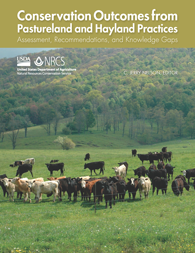Forages
Mississippi livestock producers are fortunate in being able to grow a large number of forage crops. These include both warm and cool season species of legumes and grasses. Both perennial and annual forages are common.
Warm season perennial grasses include bermudagrass and bahiagrass. Sorghum-sudangrass hybrids and pearl millets are summer annual grasses. Annual ryegrass and the small grains (oats, wheat, rye) are common winter annual grasses. Perennial, cool season tall fescue is grown extensively in the prairie sections and in north Mississippi. Warm season perennial legumes include alfalfa and sericea lespedeza.
Annual lespedeza and alyce clover are warm season annual legumes. White and red clovers are perennial cool season legumes. A large number of cool season annual legumes include crimson, ball, berseem, and arrowleaf clovers. Vetch and wild winter peas are also cool season annual legumes.
By using a combination of these forages for both grazing and hay, many Mississippi livestock producers are able to grow their needed feed with very few outside purchases.
Frequently Asked Questions
- Can I grow all the feed needed for my cattle?
- Should I grow both pasture and hay?
- What is the best hay grass that I can grow?
- Can I grow alfalfa in Mississippi?
- Where can I get more information on forages?
Hay Directories
- Mississippi Hay Directory
- Mississippi Market Bulletin
- Internet Hay Exchange
- Alabama Hay Listing
- Missouri Hay Directory
- Tennessee Hay Directory
Other Forage Information
- 2010 Pasture and Forage Short Course
- MSU Forage Variety Trials
- Fall Army Worms in Hay Fields and Pastures
- Weeds in forages
- Other Extension Livestock Information
- Hay Directory Listings | Hay Directory Submission Form
- MSU Forage/Livestock Support Group
- Equine Interest Groups
Decision Tools
- Hay Inventory Calculator (.xlsm file type)
If you have any problems using this file contact Rocky Lemus.
